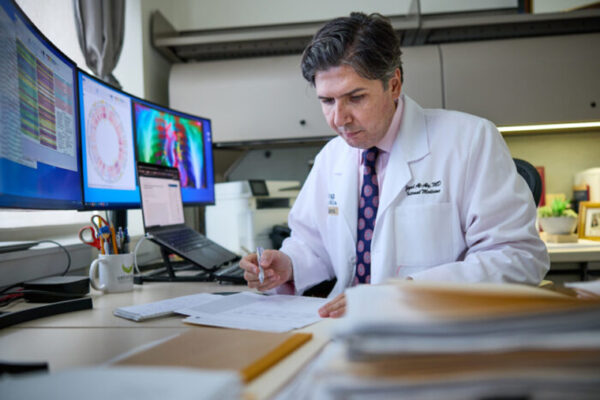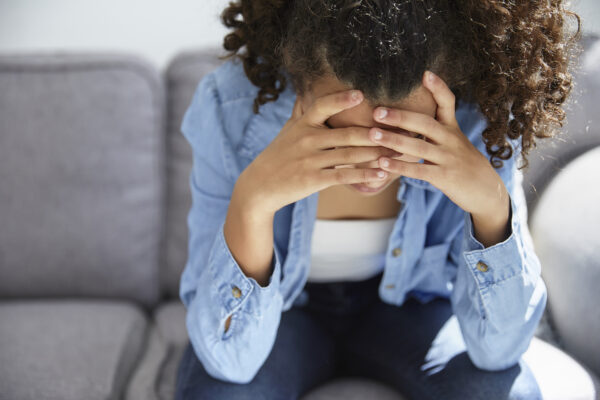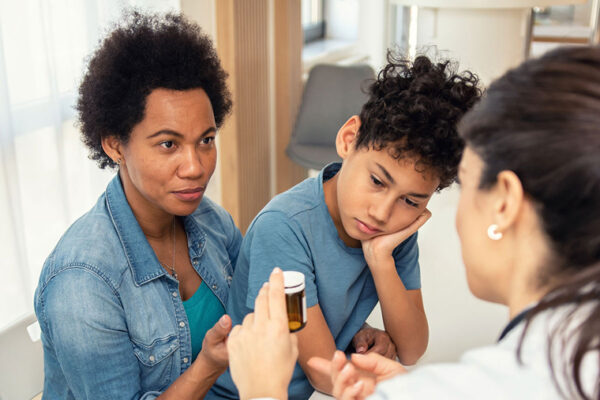With the worst of the COVID-19 pandemic apparently behind us, many have tossed aside their masks.
But not so fast, said Steven Lawrence, MD, an infectious disease specialist and a professor of medicine at Washington University School of Medicine in St. Louis. Masks do more than slow the spread of COVID. They also can stop dangerous and sometimes deadly viruses such as the flu and RSV, which are currently raging throughout the St. Louis region.
“Let’s not unlearn the lessons we’ve learned from COVID,” Lawrence said. “During respiratory virus season, it’s important to be more cautious and at least consider taking additional precautions like masking in certain situations to protect ourselves and others. A lot of us are through with masks, but why would we want to throw out one of the best tools in our toolbox?”
Here, Lawrence; Cheri LeBlanc, MD, executive director of the Habif Health & Wellness Center on the Danforth Campus and assistant professor of medicine; and Stephen Y. Liang, MD, an associate professor of medicine at the School of Medicine, share how students, faculty and staff can stay healthy this holiday season.
With the holidays arriving, how can we keep ourselves safe?
Lawrence: Be up to date on your COVID and flu vaccines. We don’t have an RSV vaccine yet, but that may be coming in the next few years. Also, stay home when you are sick. And when you’re in an indoor setting for an extended period with people who don’t live with you, it is completely appropriate to consider masking.
Also, testing is still a tool for COVID. If you are going to be around people at high risk for severe COVID for any length of time, test 24 to 48 hours before your arrival and then immediately before you go. If those two tests are both negative, you should be good to go as long as you don’t have symptoms. If you do have symptoms, especially a fever, you do not want to be around people who are at high risk.
But the new normal should be, whether it’s for social situations or work, if you have symptoms you should get tested and, if the test is positive for COVID or flu, stay home. If it is negative, still mask indoors when around others until the symptoms resolve. We should have this emblazoned on our brains – none of us should ever be unmasked with respiratory symptoms ever again.
Does masking prevent the flu?
Lawrence: We have more and more evidence that masking reduces your risk of getting COVID and it may work even better at preventing the flu. Consider this — flu was almost non-existent in the winter of 2020-21 when most people masked and there were fewer indoor events. Every year, there are 10,000 to 50,000 people who die from flu. Just by wearing masks, we can save thousands and thousands of lives. The flu vaccine is important, too. Like the COVID vaccine, the flu vaccine provides protection against serious illness. But masking adds another layer to help prevent you from getting an infection in the first place.
Flu has arrived early. Is it too late to get the flu vaccine?
Liang: The absolute numbers are moderately high right now and rapidly increasing. We have no idea where the peak is going to be, but we expect it’s going to continue over the next couple of months into early spring or so. So no, it is not too late to get the vaccine. And the CDC reports the vaccine appears to be a good match against the current strains.
What should students do if they have a fever or are experiencing symptoms?
LeBlanc: We have a rapid test that tests for all three of these viruses — COVID, flu and RSV. We can get those results in an hour at Habif. For COVID, there is a state order for isolation if there is a positive result. We give our students a letter that they can share with their professors. We have always given students the same letter to share with their professors in the case of flu. And while there is no state order to isolate, we recommend that our students diagnosed with flu stay home until they have been fever-free for 24 hours.
Doctors at St. Louis Children’s Hospital report RSV is overwhelming local hospitals. Can adults suffer from RSV too?
Lawrence: Absolutely. While we know children less than 2 years old are the most affected age range, adults can get sick too. Most adults generally experience a mild cold with a cough and maybe some asthma-like symptoms. But adults older than 65 with underlying illnesses like COPD can get sick enough to die from RSV.
Though our students have access to RSV testing, it is less readily available to the public. And, unlike flu and COVID, there is no real treatment for it. But if you are sick, you should not be around other people.
Are you masking everyday?
Lawrence: Here’s my own risk calculus. If I am going to be in close proximity to people in an indoor space for an extended period of time, I mask. So for a quick trip to the grocery store, I don’t always mask because unless I’m standing next to the same person for a long time in the deli line, the risk is low. I did, however, mask at my daughter’s recital because I was sitting next to the same people for an hour. Everybody must decide when the benefits to themselves and to their loved ones outweigh the inconvenience of masking.
Everything you say makes sense. But people are done. A lot of us got COVID, got over it and now we want to move on.
Lawrence: Think about seatbelts. When I was a kid, we didn’t wear seatbelts and we did fine. But the thing is, the people around us are the ones who didn’t die because of car accidents. There are a lot of people who didn’t make it. So it’s like, “I got COVID. I didn’t get that sick.” Most people don’t. But do you know what, there are more than 1 million Americans who are not here to share that experience with us right now, not to mention those who have long-term complications.
What is your final message to the Washington University community?
LeBlanc: We really need to eliminate this mindset of “I’m sick, but it doesn’t matter. I need to go to class. I need to go to work.” That kind of thinking not only doesn’t help us, it can hurt everybody around us. “Power through” has been the mantra for our very high-achieving students and our high-achieving faculty and staff. But it is time to change the belief that your health doesn’t matter. Your health does matter, and the health of those around you matters.



